The 2024 Subaru Crosstrek Is About the Destination, Not the Journey
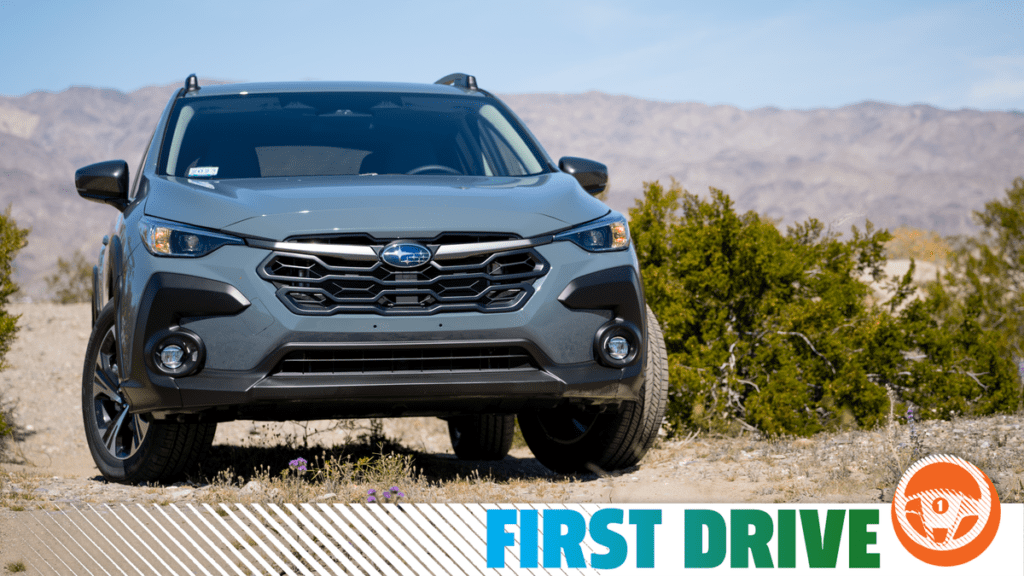
Photo: Steve DaSilva / Jalopnik
What makes a human being? From a psychological standpoint, you could argue it’s the way we strive for more — doing more, seeing more, being more than we were the day before. From an evolutionary standpoint, you might say it’s something much simpler: Tool use. After all, no other species on Earth designs, builds, and uses tools quite the way we do. With the 2024 Crosstrek, Subaru wants to split the difference. The company looked out at its customers and saw people who wanted more — more camping trips, more hiking, more outdoors adventures. To help them get there, the company turned to the other side of humanity, and built a damned fine tool.
Full Disclosure: Subaru shipped me out to Palm Springs to drive the new Crosstrek, where they paid for my room, board, transit, and Joshua Tree park access.
What’s New About The 2024 Subaru Crosstrek?
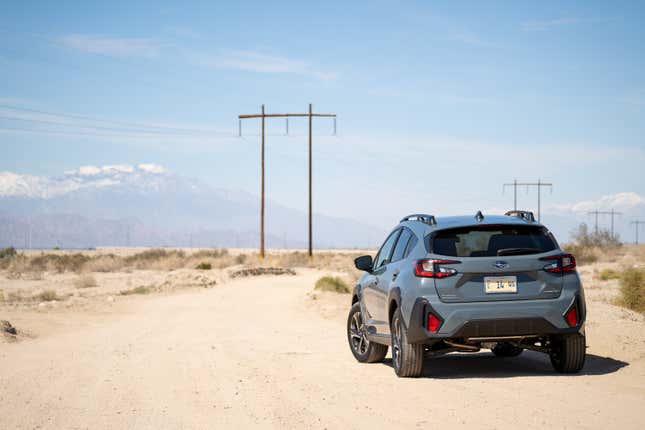
Photo: Steve DaSilva / Jalopnik
This new year brings a whole new generation for the Crosstrek, and that comes with a whole host of changes. The broad strokes are the same: A wagon built on the Subaru Global Platform, powered by a 2.0- or 2.5-liter flat-four that drives all four wheels through a CVT. But look closer, and you’ll see that Subaru changed plenty.
Subaru stiffened the chassis of the new car with additional sealant and swapped steel fenders out for weight-saving aluminum. The steering rack is now borrowed from the WRX, and the CVT has been modified to reduce noise as it winds up. New engine mounts reduce vibrations from the flat-four, and updated EyeSight cameras give the system a wider field of view — and the ability to swerve the car within its lane to dodge obstacles.
G/O Media may get a commission
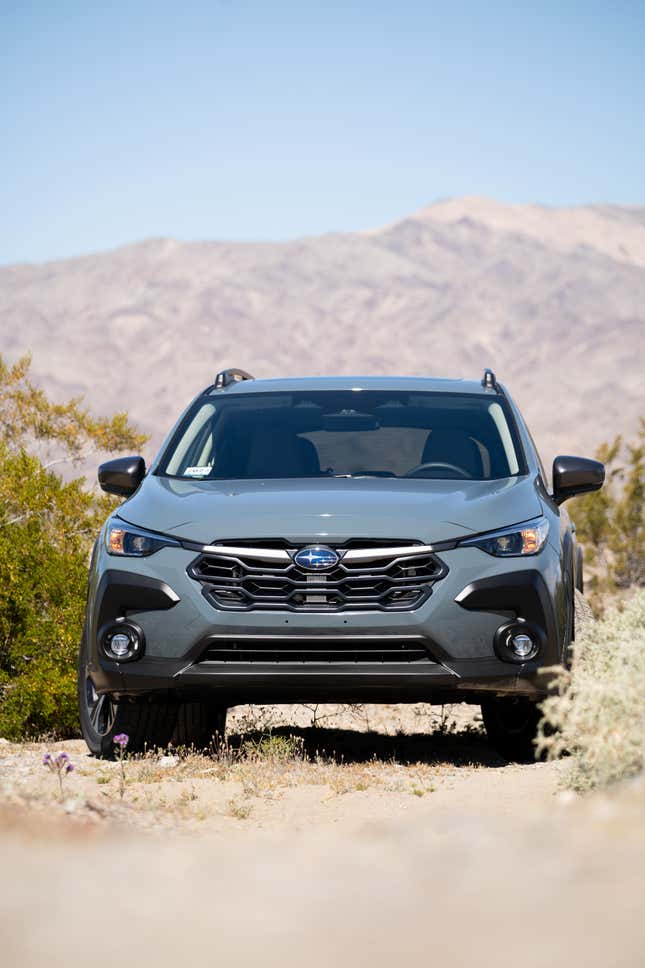
Photo: Steve DaSilva / Jalopnik
What Are the Specs?
The new Crosstrek shares the outgoing car’s engine options, with buyers getting the choice between a 2.0-liter flat-four making 152 horsepower and 145 lb-ft of torque, or a 2.5-liter making 182 hp and 178 lb-ft. The 2.5-liter cars will be introduced later this year, so my tester had the smaller, slower engine. That Premium-trim 2.0-liter car weighs in at a Subaru-estimated 3,296 pounds — heavier than the Base, but slightly lighter than the 2.5-liter Sport and Limited. That power and weight, plus Subaru’s all-wheel-drive, all adds up to 27 mpg city, 34 highway for the 2.0-liter, or 26/33 for the bigger engine.
The Crosstrek keeps the 8.7-inch ground clearance of its prior generation, and has approach and departure angles of 18 degrees and 30.1 degrees, respectively. Those numbers may not sound like much in a world of Wranglers and Broncos, but it’s probably enough to get you where you need to go — provided it isn’t on the other side of a rock crawl.

Weird thing about the new Crosstrek bumper: Those front license plate mounting holes appear to be molded in, not drilledPhoto: Steve DaSilva / Jalopnik
How Does It Look?
Better in person than it did in Subaru’s original press photos. The nose still feels snubbed, too tall for its length, and the plastic-clad cheekbones still stand out (in a bad way) against the painted bumper. But the headlights and taillights, minuscule in the press shots, are integrated well into the real-life sheet metal — they look good.
The plastic cladding around the Crosstrek’s fenders is larger than on the previous generation, but it fits the character of this car better than it does on the WRX. Plus, the cladding hides functional vents that allow air to escape the wheelwells — Subaru claims this aids highway stability, though you’d likely have to drive the car back-to-back with its prior generation to really notice the difference.
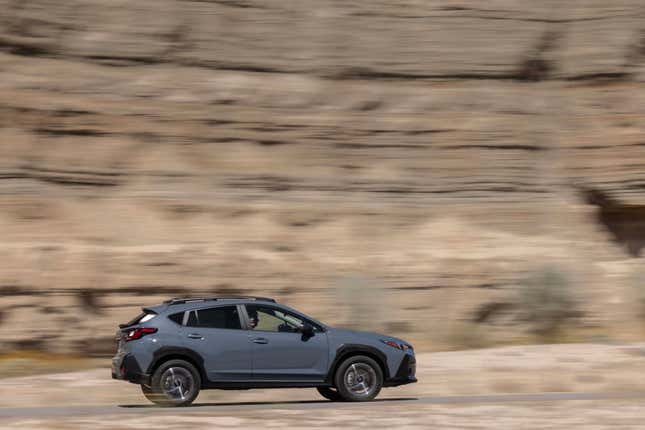
Who’s that riding shotgun?Photo: Subaru
How Does it Drive?
Around town, on back roads, the Crosstrek is surprisingly fun to haul around. The car is still laughably slow with the 2.0-liter engine — I once had to make a merge from a dead stop into traffic and feared that I simply wouldn’t be able to match the pace — but the steering feel from that WRX rack brings it into entertaining, slow-car-fast territory. The ride is composed, neither harshly stiff nor wallowingly soft, though it can be unsettled by broken pavement at highway speeds.
On the highway, the Crosstrek gets a little weird. That steering that I enjoyed so much on back-roads disappears as the speed-sensitive rack adjusts effort on the fly — it feels like the car doesn’t quite know how it wants the steering to feel. As you move the wheel off-center, there’s a noticeable hitch in the the wheel, as if the car’s computer is still calculating the ideal weight for this particular situation.
Subaru’s CVT gets a solid fine-to-good-enough rating, inoffensive and generally capable of moving power from the engine to the wheels. It still has moments where it seems confused by driver inputs, but those are few and far between — for the most part, it fades into the background. The brakes, however, take up the slack: They bite hard after a small amount of pedal travel, then ease themselves off to a reasonable level. Perhaps the new electronic brake booster, implemented to play more nicely with the EyeSight safety system, is running some calculations in the background.
How’s The Interior?
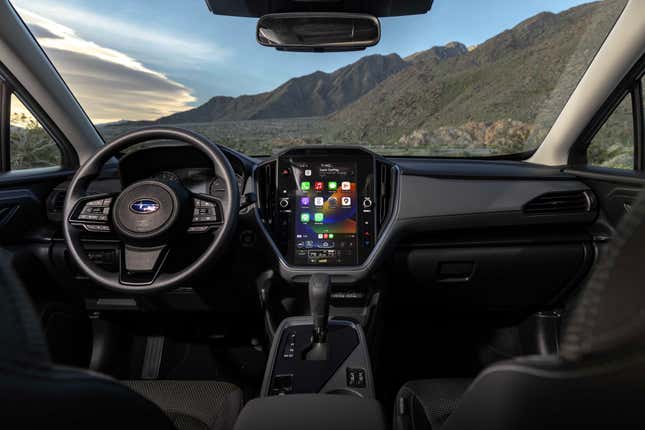
Photo: Subaru
If you’ve ever seen the inside of a Subaru, you’ll know exactly what to expect in the Crosstrek. That’s not a bad thing — the company has a solid concept of how to build an interior, and it works for this car. The infotainment gets its job done, and while Subaru gets some knocks for layout and typeface choices, those are balanced out by the presence of real, physical buttons and knobs for volume, radio tuning, front and rear defoggers, and climate temperature. There’s also a large button on the dash to reset your trip odometer, for all those off-road excursions that rely on pre-printed directions.
Subaru put a lot of effort into the Crosstrek’s front seats, citing studies about head sway and motion sickness to show that its latest design is empirically better than the competition. As someone not particularly prone to motion sickness from driving, I can’t attest to that part of the experience, but I can say the Crosstrek’s seats punch above their weight class for comfort. They’re supportive without being too firm, hold you in place without massive bolsters, and have genuinely impressive lumbar support — if they were leather, I’d say they could be straight out of a Lexus.
The interior of the Crosstrek is a quieter place to be than in prior years, thanks to the tamped-down CVT noise, though that leaves room for you to notice how much wind the cabin catches at highway speeds. For a car at this price point, however, it’s forgivable — there’s no active noise cancellation to be found here.
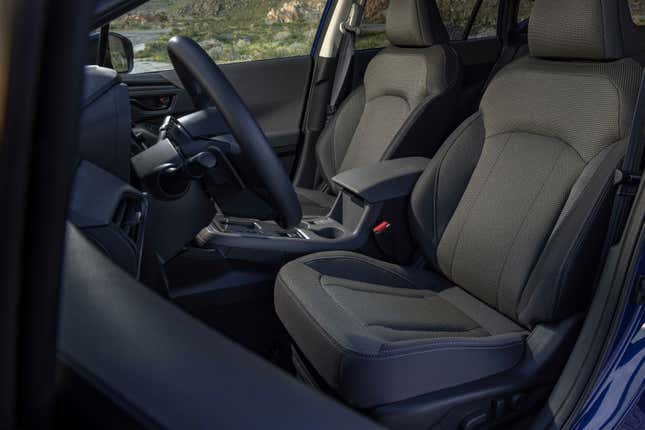
Photo: Subaru
How Does It Compare to the Competition?
The Crosstrek goes up against the rest of the subcompact crossover crowd — the Honda HR-V, Toyota Corolla Cross, Chevy Trailblazer, and Hyundai Kona. Within the segment, the Subaru is actually one of the more expensive options, though the price delta starts to shrink as you load the others up with all-wheel-drive. Its base trim starts at $24,995, before a $1,295 destination fee, and can option all the way up to the $30,895 Limited trim. Beyond the four driven wheels, that base price also gets you Subaru’s full EyeSight driver assist package, dual-zone climate control, off-road X-Mode, and headlights that turn with your steering wheel. It’s not exactly rental spec, but you will have to step up to the $26,195 Premium trim for wireless CarPlay and Android Auto (the base model requires a cable) and those oh-so-desirable roof rails.
Yet, more than any other entry in the segment (perhaps tied with the Kia Seltos), the Crosstrek trades on capability. Its all-wheel-drive is full-time, with modes that attempt to simulate locking front and rear differentials. It’s built to be climbed on, so you can more easily reach your rooftop cargo box or kayak. The trunk has cup holders, so you can sit with the hatch open and watch the sun rise with your coffee. Subaru thinks about those little things, the features and details that will help owners in their adventures, and that’s what keeps the Subie faithful coming back.
Final Thoughts
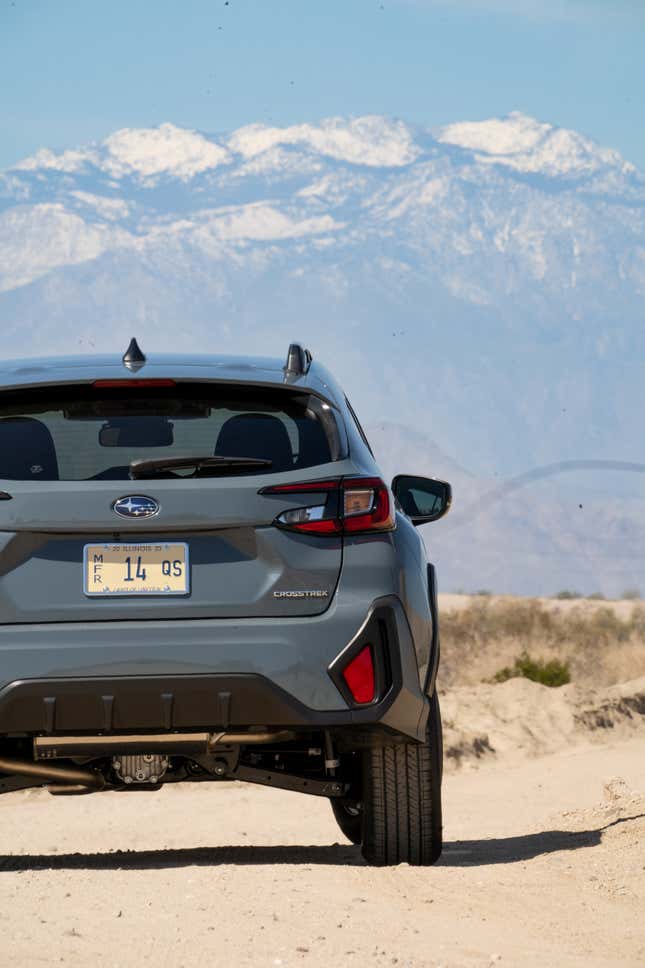
Photo: Steve DaSilva / Jalopnik
The Crosstrek isn’t a car you’re meant to think about. It’s a tool, designed to get you places that you’ll remember. If it’s unmemorable but gets you from point A to point B without fanfare or excitement, it’s doing its job well. The Crosstrek isn’t meant to be your experience the way a track-prepped Miata or rock-crawling Jeep is. It’s just meant to get you to your experience — the campsite, the rapids, the mountain biking trail.
In that way, the Crosstrek is exemplary. It’s perfectly capable for its price point, it’ll get you through trails that people buy 4Runners to traverse. It’s comfortable enough on the dirt, unbothered by fire roads and light trails. When your dreams of more take you past the beaten path, the Crosstrek will get you there.
The question, for a prospective buyer, is what that capability is worth. The Corolla Cross is more efficient in the city, the HR-V has a more premium interior. By objective metrics, if all you’re doing is commuting to work, the Crosstrek probably isn’t for you. But if you clock in with dreams of the weekend, and clock out with your paycheck earmarked for tents and sleeping bags, the Crosstrek may just be what you’re looking for.

Photo: Steve DaSilva / Jalopnik
2024 Subaru Crosstrek Premium CVT Specs
Engine type
Regular Unleaded H-4
Transmission/Drive
CVT w/OD



